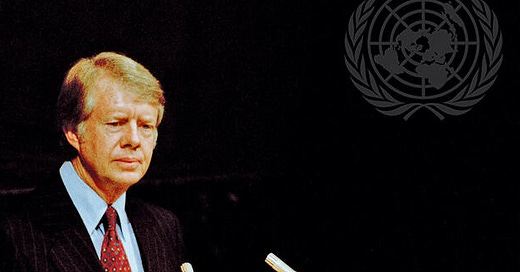Jimmy Carter: human rights institutionalist
By prioritizing ratification of human rights treaties, he understood that US leadership demands we live by the rules we set
Jimmy Carter was an unexemptionalist, because he believed the United States should be a fully invested member of the international human rights system. For that, Unexemptional salutes the dearly departed president.
Many tributes to Carter mention his record on human rights, from the campaign to the White House to his post-presidency efforts through the Carter Center.
An underappreciated aspect of this legacy is that Carter did more to institutionalize human rights in law and in the policy-making apparatus than any other president. Let’s take this moment to remind ourselves how the United States’ refusal to be a good team player undermines the principled-sounding rhetoric our leaders spout about freedom, liberty and human rights.
Amidst all the talk of U.S.-China competition, the fact is that the United States has ratified fewer (3) of the nine core international human rights instruments than China (6). Shameful.
Carter’s record:
ICCPR and ICESCR: signed
In 1966, the United Nations adopted the two main human rights treaties: International Covenant on Civil and Political Rights (ICCPR) and the International Covenant on Economic, Social and Cultural Rights (ICESCR). Even though the U.S. champions its leadership in drafting the Universal Declaration of Human Rights, from which the two Covenants derive, it dragged it feet on implementation. Until Jimmy Carter.
On October 5, 1977, at UN headquarters, President Jimmy Carter put the U.S. signature on the ICCPR and ICESR. The former had to wait until 1992 to get ratified. The latter still sits unratified.
CEDAW: signed
The one UN human rights treaty negotiated during Carter’s term was the Convention on the Elimination of All Forms of Discrimination against Women (CEDAW), the international bill of rights for women, adopted in 1979. Carter signed it in July 1980. But the Senate has never ratified it.
American Convention on Human Rights: signed
Carter put the Unites States’ signature on the American Convention on Human Rights, basically the ICCPR for members of the Organization of American States. It remains unratified by the U.S.
Advocacy for treaties later ratified
Carter also urged the Senate to ratify two treaties that were signed before he became president and ratified after his term: the United Nations Genocide Convention (signed 1948, ratified 1988) and the Convention on the Elimination of All Forms of Racial Discrimination (signed 1966, ratified 1994). (He also supported ratification of the Convention on the Rights of the Child (CRC), signed in 1995 but not yet ratified.)
State Department Bureau for Human Rights: created
It was during the first year of the Carter Administration that the State Department established a standing office to give human rights a formal role in foreign policymaking, what is known today as the Bureau of Human Rights, Democracy and Labor. He nominated Patricia Murphy Derian (a woman, rare at the time) to be its assistant secretary.
Country Reports on Human Rights Practices: written
In 1977, under Carter this new human rights bureau issued the first Country Reports on Human Rights Practices, which has become an invaluable tool for government officials, Congress, NGOs and activists to assess human rights conditions and make human rights policy.
* * * * * *
Why hasn’t the United States ratified more human rights treaties? Because of opposition by conservatives and apathy by others. Publicly, the arguments you hear from conservative voices concern principles of sovereignty and such. But colloquially, it’s that they don’t want to be forced by international law to treat women as equal humans (CEDAW) or have American parents prohibited from being able to beat their children (CRC).
Bush 41 signed the Convention Against Torture and was president when ICCPR was ratified. Clinton got the conventions against torture and racial discrimination ratified and signed CRC. Bush 43 oversaw ratification of two CRC protocols. Obama signed the Convention on the Elimination of All Forms of Racial Discrimination.
Biden, despite all his rhetoric about democracy and human rights, and the fact that he used to chair the Senate Committee responsible for ratifying treaties, never lifted a finger.
Jimmy Carter did more than all of them.
Given the incoming president’s innate antipathy toward rule of law and the fact that Project 2025 plans to eviscerate the international human rights system, we can expect regress rather than progress under Trump. And yet, if we can allow ourselves a propitious moment, this is an opportunity to remind ourselves of the legacy and lesson that Jimmy Carter bequeaths us on human rights – the need to institutionalize the principles we voice. To be an exceptional nation, the United States must also be an unexemptional nation.



